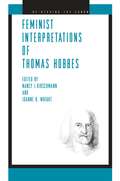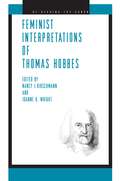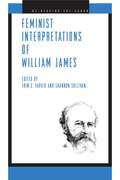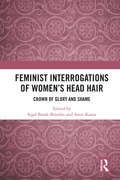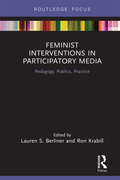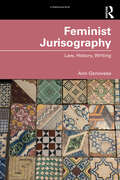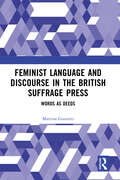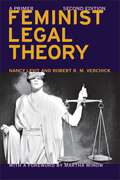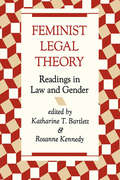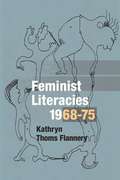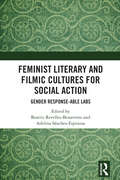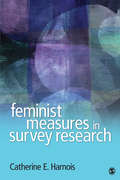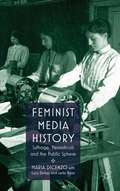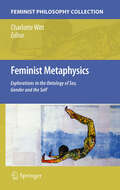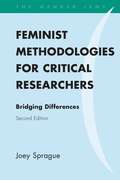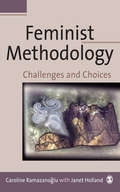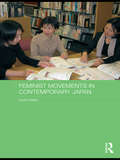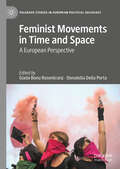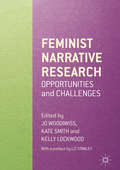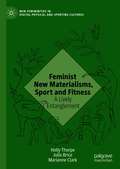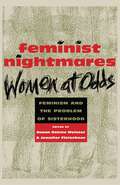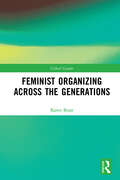- Table View
- List View
Feminist Interpretations of Thomas Hobbes
by Nancy J. Hirschmann Joanne H. WrightFeminist Interpretations of Thomas Hobbes features the work of feminist scholars who are centrally engaged with Hobbes’s ideas and texts and who view Hobbes as an important touchstone in modern political thought. Bringing together scholars from the disciplines of philosophy, history, political theory, and English literature who embrace diverse theoretical and philosophical approaches and a range of feminist perspectives, this interdisciplinary collection aims to appeal to an audience of Hobbes scholars and nonspecialists alike. As a theorist whose trademark is a compelling argument for absolute sovereignty, Hobbes may seem initially to have little to offer twenty-first-century feminist thought. Yet, as the contributors to this collection demonstrate, Hobbesian political thought provides fertile ground for feminist inquiry. Indeed, in engaging Hobbes, feminist theory engages with what is perhaps the clearest and most influential articulation of the foundational concepts and ideas associated with modernity: freedom, equality, human nature, authority, consent, coercion, political obligation, and citizenship. Aside from the editors, the contributors are Joanne Boucher, Karen Detlefsen, Karen Green, Wendy Gunther-Canada, Jane S. Jaquette, S. A. Lloyd, Su Fang Ng, Carole Pateman, Gordon Schochet, Quentin Skinner, and Susanne Sreedhar.
Feminist Interpretations of Thomas Hobbes (Re-Reading the Canon)
by Nancy J. Hirschmann Joanne H. WrightFeminist Interpretations of Thomas Hobbes features the work of feminist scholars who are centrally engaged with Hobbes’s ideas and texts and who view Hobbes as an important touchstone in modern political thought. Bringing together scholars from the disciplines of philosophy, history, political theory, and English literature who embrace diverse theoretical and philosophical approaches and a range of feminist perspectives, this interdisciplinary collection aims to appeal to an audience of Hobbes scholars and nonspecialists alike.As a theorist whose trademark is a compelling argument for absolute sovereignty, Hobbes may seem initially to have little to offer twenty-first-century feminist thought. Yet, as the contributors to this collection demonstrate, Hobbesian political thought provides fertile ground for feminist inquiry. Indeed, in engaging Hobbes, feminist theory engages with what is perhaps the clearest and most influential articulation of the foundational concepts and ideas associated with modernity: freedom, equality, human nature, authority, consent, coercion, political obligation, and citizenship.Aside from the editors, the contributors are Joanne Boucher, Karen Detlefsen, Karen Green, Wendy Gunther-Canada, Jane S. Jaquette, S. A. Lloyd, Su Fang Ng, Carole Pateman, Gordon Schochet, Quentin Skinner, and Susanne Sreedhar.
Feminist Interpretations of Thomas Hobbes (Re-Reading the Canon)
by Nancy J. Hirschmann and Joanne H. WrightFeminist Interpretations of Thomas Hobbes features the work of feminist scholars who are centrally engaged with Hobbes’s ideas and texts and who view Hobbes as an important touchstone in modern political thought. Bringing together scholars from the disciplines of philosophy, history, political theory, and English literature who embrace diverse theoretical and philosophical approaches and a range of feminist perspectives, this interdisciplinary collection aims to appeal to an audience of Hobbes scholars and nonspecialists alike.As a theorist whose trademark is a compelling argument for absolute sovereignty, Hobbes may seem initially to have little to offer twenty-first-century feminist thought. Yet, as the contributors to this collection demonstrate, Hobbesian political thought provides fertile ground for feminist inquiry. Indeed, in engaging Hobbes, feminist theory engages with what is perhaps the clearest and most influential articulation of the foundational concepts and ideas associated with modernity: freedom, equality, human nature, authority, consent, coercion, political obligation, and citizenship.Aside from the editors, the contributors are Joanne Boucher, Karen Detlefsen, Karen Green, Wendy Gunther-Canada, Jane S. Jaquette, S. A. Lloyd, Su Fang Ng, Carole Pateman, Gordon Schochet, Quentin Skinner, and Susanne Sreedhar.
Feminist Interpretations of William James (Re-Reading the Canon)
by Shannon Sullivan Erin C. TarverWidely regarded as the father of American psychology, William James is by any measure a mammoth presence on the stage of pragmatist philosophy. But despite his indisputable influence on philosophical thinkers of all genders, men remain the movers and shakers in the Jamesian universe—while women exist primarily to support their endeavors and serve their needs. How could the philosophy of William James, a man devoted to Victorian ideals, be used to support feminism? Feminist Interpretations of William James lays out the elements of James’s philosophy that are particularly problematic for feminism, offers a novel feminist approach to James’s ethical philosophy, and takes up epistemic contestations in and with James’s pragmatism. The results are surprising. In short, James’s philosophy can prove useful for feminist efforts to challenge sexism and male privilege, in spite of James himself.In this latest installment of the Re-Reading the Canon series, contributors appeal to William James’s controversial texts not simply as an exercise in feminist critique but in the service of feminism.Along with the editors, the contributors are Jeremy Carrette, Lorraine Code, Megan Craig, Susan Dieleman, Jacob L. Goodson, Maurice Hamington, Erin McKenna, José Medina, and Charlene Haddock Seigfried.
Feminist Interpretations of William James (Re-Reading the Canon)
by Shannon Sullivan Erin C. TarverWidely regarded as the father of American psychology, William James is by any measure a mammoth presence on the stage of pragmatist philosophy. But despite his indisputable influence on philosophical thinkers of all genders, men remain the movers and shakers in the Jamesian universe—while women exist primarily to support their endeavors and serve their needs. How could the philosophy of William James, a man devoted to Victorian ideals, be used to support feminism? Feminist Interpretations of William James lays out the elements of James’s philosophy that are particularly problematic for feminism, offers a novel feminist approach to James’s ethical philosophy, and takes up epistemic contestations in and with James’s pragmatism. The results are surprising. In short, James’s philosophy can prove useful for feminist efforts to challenge sexism and male privilege, in spite of James himself.In this latest installment of the Re-Reading the Canon series, contributors appeal to William James’s controversial texts not simply as an exercise in feminist critique but in the service of feminism.Along with the editors, the contributors are Jeremy Carrette, Lorraine Code, Megan Craig, Susan Dieleman, Jacob L. Goodson, Maurice Hamington, Erin McKenna, José Medina, and Charlene Haddock Seigfried.
Feminist Interrogations of Women's Head Hair: Crown of Glory and Shame
by Sigal Barak-Brandes Amit KamaFeminist scholarship has looked extensively at the perception of the body as a flexible construction of cultural and social dictates, but head hair has been often overlooked. Feminist Interrogations of Women's Head Hair brings new focus to this underrepresented topic through its intersections with contemporary socio-cultural contexts. Scholars from a wide range of disciplines investigate private and public meanings associated with female head hair, problematising our assumptions about its role and implications in the 21st Century. Readers are invited to reflect on the use of hair in popular culture, such as children’s television and pop album artwork, as well as in work by women artists. Studies examine the lived experiences of women from a range of backgrounds and histories, including curly-haired women in Israel, African American women, and lesbians in France. Other essays interrogate the connotations of women’s head hair in relation to body image, religion, and aging. Feminist Interrogations of Women's Head Hair brings together cultural discourses and the lived experiences of women, across time and place, to reveal the complex and ever-evolving significance of hair. It is an important contribution to the critical feminist thought in cultural studies, fashion studies, media studies, African American studies, queer theory, gerontology, psychology, and sociology.
Feminist Interventions in Participatory Media: Pedagogy, Publics, Practice (Focus on Global Gender and Sexuality)
by Lauren S. Berliner Ron KrabillFeminist Interventions in Participatory Media is an edited collection that brings together feminist theory and participatory media pedagogy. It asks what, if anything, is inherently feminist about participatory media? Can participatory media practices and pedagogies be used to reanimate or enact feminist futures? And finally, what reimagined feminist pedagogies are opened up (or closed down) by participatory media across various platforms, spaces, scales, and practices? Each chapter looks at a specific example where the author(s) have used participatory media to integrate technology and feminist praxis in production and teaching. The case studies originate from sites as varied as community organizations to large scale collaborations between universities, public media, and social movements. They offer insights into the continuities and disjunctures which stem from the adoption of and adaption to participatory media technologies. In complicating and dismantling perceptions of participatory media as inherently liberatory, Feminist Interventions in Participatory Media curbs the excesses of such claims and highlights those pedagogical methods and processes that do hold liberatory potential. This collection thus provides a roadmap toward (re)imagining feminist futures, while grounding that journey in the histories, practices, and past insights of feminism and media studies.
Feminist Judgments
by Stanchi, Kathryn M. and Berger, Linda L. and Crawford, Bridget J. Kathryn M. Stanchi Linda L. Berger Bridget J. CrawfordWhat would United States Supreme Court opinions look like if key decisions on gender issues were written with a feminist perspective? Feminist Judgments brings together a group of scholars and lawyers to rewrite, using feminist reasoning, the most significant US Supreme Court cases on gender from the 1800s to the present day. The twenty-five opinions in this volume demonstrate that judges with feminist viewpoints could have changed the course of the law. The rewritten decisions reveal that previously accepted judicial outcomes were not necessary or inevitable and demonstrate that feminist reasoning increases the judicial capacity for justice. Feminist Judgments opens a path for a long overdue discussion of the real impact of judicial diversity on the law as well as the influence of perspective on judging.
Feminist Jurisography: Law, History, Writing
by Ann GenoveseThis book offers a jurisprudential meditation on and methodological performance of how feminist and legal thought come into relation. This book is about the conduct of one’s scholarship and why it requires examination. Across six essays, the book reintroduces official and unofficial jurisprudence writing of the late 20th century to show how disciplinary methods were transformed, and how relations between people and place, and between law and humanities, were transferred from the periphery to the centre of contemporary scholarship. To demonstrate this story, Feminist Jurisography experiments with genre, style, and form to historicise the relationship of a feminist jurisprudent to her own sources, methods, and interlocutors; and remind that it was feminist intellectuals from 1949 onwards who altered conducts of interdisciplinary scholarship in ways that are underacknowledged today. It exemplifies why naming a practice for yourself is an acknowledgment of relations of difference, collaboration, and inheritance, but also a performance of the feminist tradition of intellectual self-assertion that the book explores. The book will be a useful resource for scholars and students of law and humanities, feminism, and history, and of value to a general audience interested in feminist ideas. The book will benefit contemporary conversations about the history and status of feminist contributions to these fields.
Feminist Language and Discourse in the British Suffrage Press: Words as Deeds
by Martina GuzzettiFeminist Language and Discourse in the British Suffrage Press: Words as Deeds offers a comprehensive exploration of feminist discourse, focusing on the dynamic and evolving concept of gender within the context of British suffrage periodicals from 1907 to 1914.Though its motto was ‘deeds, not words’, the movement for British women’s enfranchisement exploited the press to convey its message and aid the campaign. Adopting a (socio)linguistic perspective and a discourse analysis methodology, the book focuses on the theme of gender and on the development of feminist counter-language and counter-discourses using articles taken from the three major suffrage publications: Votes for Women, The Vote, and Common Cause. Through a combination of corpus linguistics and discourse analysis, the study of the interplay of language, representation, gender, and power provides insights into how these publications challenged and reshaped societal norms, with a specific focus on the case of medical misogyny.Feminist Language and Discourse in the British Suffrage Press: Words as Deeds challenges traditional views of suffrage activities, and is of value to researchers in fields such as feminist studies, language and gender studies, and periodical studies.
Feminist Legal Theory: A Primer (Critical America #74)
by Nancy Levit Robert R.M. Verchick Martha MinowFeminist legal theory is one of the most dynamic fields in the law, and it affects issues ranging from child custody to sexual harassment. Since its initial publication in 2006, Feminist Legal Theory: A Primer has received rave reviews. Now, in the completely updated second edition of this outstanding primer, Nancy Levit and Robert R.M. Verchick introduce the diverse strands of feminist legal theory and discuss an array of substantive legal topics, pulling in recent court decisions, new laws, and important shifts in culture and technology. The book centers on feminist legal theories, including equal treatment theory, cultural feminism, dominance theory, critical race feminism, lesbian feminism, postmodern feminism, and ecofeminism. Readers will find new material on women in politics, gender and globalization, and the promise and danger of expanding social media. Updated statistics and empirical analysis appear throughout. The authors, prominent experts in the field, also address feminist legal methods, such as consciousness-raising and storytelling.The primer offers an accessible and pragmatic approach to feminist legal theory. It demonstrates the ways feminist legal theory operates in real-life contexts, including domestic violence, reproductive rights, workplace discrimination, education, sports, pornography, and global issues of gender. The authors highlight a sweeping range of cutting-edge topics at the intersection of law and gender, such as single-sex schools, abortion, same-sex marriage, rape on college campuses, and international trafficking in women and girls. At its core, Feminist Legal Theory shows the importance of the roles of law and feminist legal theory in shaping contemporary gender issues.
Feminist Legal Theory: Readings In Law And Gender
by Katherine BartlettThe emergence of feminist legal theory has reshaped people's understanding of the law and its potential for reforming social and political norms. This collection includes both classic and new papers of feminist work in philosophy, psychoanalysis, political theory and literary criticism.
Feminist Literacies, 1968-75
by Kathryn Thoms FlanneryIn the late 1960s and early 1970s, ordinary women affiliated with the women's movement were responsible for a veritable explosion of periodicals, poetry, and manifestos, as well as performances designed to support "do-it-yourself" education and consciousness-raising. Kathryn Thoms Flannery discusses this outpouring and the group education, brainstorming, and creative activism it fostered as the manifestation of a feminist literacy quite separate from women's studies programs at universities or the large-scale political workings of second-wave feminism. Seeking to break down traditional barriers such as the dichotomies of writer/reader or student/teacher, these new works also forged polemical alternatives to the forms of argumentation traditionally used to silence women, creating a space for fresh voices. Feminist Literacies explores these truly radical feminist literary practices and pedagogies that flourished during a brief era of volatility and hope.
Feminist Literary and Filmic Cultures for Social Action: Gender Response-able Labs
by Beatriz Revelles-Benavente Adelina Sánchez-EspinosaFeminist Literary and Filmic Cultures for Social Action: Gender Response-able Labs examines teaching and research practices under feminist new materialisms, affect theories and response-ability through literary and visual products, and offers possible bridges between academia and activism to create feminist interventions in contemporary neoliberal structures.Featuring chapters from contributors across a wide range of disciplines, this book follows a methodological framework that blends traditionally opposite categories, such as theory and practice, and explores contemporary literature and films as case studies within innovative “feminist response-able labs”.In Feminist Literary and Filmic Cultures for Social Action readers will encounter a collaborative trans-disciplinary toolbox which can be of use to multiple disciplines and an invaluable resource to advanced undergraduate students, postgraduate researchers and scholars in literary studies, film studies, feminist theories, new materialisms, and affective pedagogies
Feminist Measures in Survey Research
by Catherine E. HarnoisFeminist Measures in Survey Research book offers a new approach for doing quantitative feminist research, demonstrating how a feminist perspective can inform virtually every aspect of the research process, from survey design, to statistical modeling, to the theoretical frameworks used to interpret results. Catherine E. Harnois makes feminist theory, particularly multiracial feminist theory, accessible and relevant to survey researchers. She assists students and researchers in incorporating these theories into survey design and analysis and shows how they this can offer substantive insights into the social world that have been underutilized to date by survey researchers.
Feminist Media History
by Maria Dicenzo Lucy Delap Leila RyanHighlighting the contributions of feminist media history to media studies and related disciplines, this book focuses on feminist periodicals emerging from or reacting to the Edwardian suffrage campaign and situates them in the context of current debates about the public sphere, social movements, and media history.
Feminist Metaphysics
by Charlotte WittThe present volume is an exciting new collection of original essays by outstanding feminist theorists including Sally Haslanger, Marilyn Frye and Linda Alcoff. Feminist Metaphysics is the first collection of articles addressing metaphysical issues from a feminist perspective. The essays cover central feminist topics including: the ontology of sex and gender, persons, identity and subjectivity, and the relations among experience, ideology and reality. Many of the papers combine cutting-edge feminist theory with contemporary metaphysics and the philosophy of language. The volume is also distinctive in including articles representing both analytic and continental perspectives on metaphysics. The essays are philosophically sophisticated and are primarily intended for a professional audience of philosophers and feminist theorists.
Feminist Methodologies for Critical Researchers: Bridging Differences, Second Edition
by Joey SpragueA discussion of why methodology matters & how it affects the impact of social science research on society. Sprague defends the social scientific project & then shows how to engage with this project in ways that embody feminist values while producing first rate research results.
Feminist Methodology: Challenges and Choices
by Janet Holland Caroline Ramazanoglu`An accessible, clearly explained review of difficult concepts within this arena as well as relevant debates. Its strengths are in outlining possible considerations that need to be taken into account when making methodological choices. It also clearly explains how these choices impact knowledge production. This book would undoubtedly be of considerable use to anyone seeking to understand and get to grips with feminist methodological issues′ - Feminism and Psychology Who would be a feminist now? Contemporary ′political realism′ suggests that the essentials of the battle have already been won, and the current generation of women entering University is used to seeing feminism presented as ′old fashioned′, ′extreme′ and ′unrealistic′. Challenging such assumptions, this important new book argues for the value of empirical investigations of gendered life, and brings together the theoretical, political and practical aspects of feminist methodology. Feminist Methodology - demonstrates how feminist approaches to methodology engage with debates in western philosophy to raise critical questions about knowledge production - shows that feminist methodology has a distinctive place in social research - guides the reader through the terrain of feminist methodology and clarifies how feminists can claim knowledge of gendered social existence - connects abstract issues of theory with issues in fieldwork practice. This timely and accessible book will be an essential resource for students in women′s studies, gender studies, sociology, cultural studies, social anthropology and feminist psychology.
Feminist Movements in Contemporary Japan (ASAA Women in Asia Series)
by Laura DalesIn contemporary Japan there is much ambivalence about women’s roles, and the term "feminism" is not widely recognised or considered relevant. Nonetheless, as this book shows, there is a flourishing feminist movement in contemporary Japan. The book investigates the features and effects of feminism in contemporary Japan, in non-government (NGO) women’s groups, government-run women’s centres and the individual activities of feminists Haruka Yoko and Kitahara Minori. Based on two years of fieldwork conducted in Japan and drawing on extensive interviews and ethnographic data, it argues that the work of individual activists and women’s organisations in Japan promotes real and potential change to gender roles and expectations among Japanese women. It explores the ways that feminism is created, promoted and limited among Japanese women, and advocates a broader construction of what the feminist movement is understood to be and a rethinking of the boundaries of feminist identification. It also addresses the impact of legislation, government bureaucracy, literature and the internet as avenues of feminist development, and details the ways which these promote agency – the ability to act – among Japanese women.
Feminist Movements in Time and Space: A European Perspective (Palgrave Studies in European Political Sociology)
by Donatella Della Porta Giada Bonu RosenkranzThis volume provides a broad analysis of feminist movements--both historical and present-day--in Europe. It will fill the gap in the literature on feminist mobilizations through a systematic analysis of European third wave feminism from a cross-national perspective (covering Denmark, France, Greece, Italy, Poland, Slovenia, Spain, and Turkey) and a cross-time perspective (covering the time frame 2010-2021). In doing this, the authors also single out the different constellations of feminist movements as related to specific national political opportunities and networks of alliance and opposition. This book will be of interest to students and scholars in gender studies, feminist theory, and social movement studies.
Feminist Narrative Research
by Jo Woodiwiss Kate Smith Kelly LockwoodThis book explores the rich, diverse opportunities and challenges afforded by research that analyses the stories told by, for and about women. Bringing together feminist scholarship and narrative approaches, it draws on empirical material, social theory and methodological insights to provide examples of feminist narrative studies that make explicit the links between theory and practice. Examining the story as told and using examples of narratives told about childhood sexual abuse, domestic /relationship abuse, motherhood, and seeking asylum, it raises wider issues regarding the role of storytelling for understanding and making sense of women's lives. This thought-provoking work will appeal to students and scholars of women's studies, feminist and narrative researchers, social policy and practice, sociology, and research methods.
Feminist New Materialisms, Sport and Fitness: A Lively Entanglement (New Femininities in Digital, Physical and Sporting Cultures)
by Holly Thorpe Julie Brice Marianne ClarkThis book offers the first critical examination of the contributions of feminist new materialist thought to the study of sport, fitness, and physical culture. Bringing feminist new materialist theory into a lively dialogue with sport studies, it highlights the possibilities and challenges of engaging with posthumanist and new materialist theories. With empirical examples and pedagogical offerings woven throughout, the book makes complex new materialist concepts and theories highly accessible. It vividly illustrates sporting matter as lively, vital, and agentic. Engaging specifically with the methodological, theoretical, ethical and political challenges of feminist new materialisms, it elaborates understandings of moving bodies and their entanglements with human, non-human, technological, biological, cultural, and environmental forces in contemporary society. This book extends humanist, representationalist, and discursive approaches that have characterized the landscape of critical research on active bodies, and invites new imaginings and articulations for sport and moving bodies in uncertain times and unknown futures.View the video abstracts for each of the book's chapter here: Chapter 1 https://www.youtube.com/watch?v=3UQy7aq1k20&list=PLdbxSLlj0ri04cOHxK37TfaQg0IAv6Znf&index=1 Chapter 2 https://www.youtube.com/watch?v=yM-Q4FmW6h8&list=PLdbxSLlj0ri04cOHxK37TfaQg0IAv6Znf&index=2 Chapter 3 https://www.youtube.com/watch?v=D0VxosyyrKg&list=PLdbxSLlj0ri04cOHxK37TfaQg0IAv6Znf&index=3 Chapter 4 https://www.youtube.com/watch?v=eN9b58fPISA&list=PLdbxSLlj0ri04cOHxK37TfaQg0IAv6Znf&index=4 Chapter 5 https://www.youtube.com/watch?v=GM3Ss_Tz0ZY&list=PLdbxSLlj0ri04cOHxK37TfaQg0IAv6Znf&index=5 Chapter 6 https://www.youtube.com/watch?v=pNbSBThlR6s&list=PLdbxSLlj0ri04cOHxK37TfaQg0IAv6Znf&index=6 Chapter 7 https://www.youtube.com/watch?v=NFRAGwH8UOY&list=PLdbxSLlj0ri04cOHxK37TfaQg0IAv6Znf&index=7
Feminist Nightmares: Feminism and the Problems of Sisterhood
by Susan Ostrov WeisserThough all women are women, no woman is only a woman, wrote Elizabeth Spelman in The Inessential Woman. Gone are the days when feminism translated simply into the advocacy of equality for women. Women's interests are not always aligned; race, class, and sexuality complicate the equation. In recent years, feminist ideologies have become increasingly diverse. Today, one feminist's most ardent political opponent may well be another feminist. As feminism grows increasingly diverse, the time has come to ask a painful and frequently avoided question: what does it mean for women to oppress women? This pathbreaking, provocative anthology addresses this troublesome dilemma from various feminist perspectives, offering an interdisciplinary collection of writings that widens our understanding of oppression to take into account women who are at odds. The book examines the social, political, and psychological ramifications of this phenomenon, as evidenced in a range of texts, from women's antislavery writing to women's anti-abortion writing, from mother-daughter incest stories to maternal surrogacy narratives, from the Bible to the popular romance nove, from Jane Austen to Alice Walker. The value of the volume is perhaps best summed up by an early response to the idea-This is a book that should never be written; feminists should concentrate on how men oppress women. Ironically, it is precisely because the subject triggers such responses, the authors argue, that a volume such as Feminist Nightmares has become a necessity.
Feminist Organizing Across the Generations (Global Gender)
by Karen BojarFeminist Organizing Across the Generations spans almost 60 years of feminist history and traces the evolution of feminist activism from the 1960s until the present. Using the Philadelphia chapter of the National Women's Organization as a starting point, Karen Bojar explores how feminist organizing was unfolding in similar ways across the county. The book examines the enormous energy put into building feminist service organizations such as women's shelters and rape crisis centers which were to have a profound impact on major social institutions, health care delivery and the justice system. The book also looks at the differences between the organizing strategies of "second wave" feminists and those of the 21st century. Much 21st-century feminist organizing is taking place outside of explicitly feminist groups, with young feminists bringing a gender justice perspective to a range of racial, economic and climate justice organizations. This book is suitable for students and scholars in women's and gender history, political history and gender studies.
